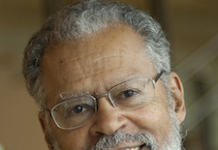 David Moinina Sengeh escaped with his family from Sierra Leone during the country’s brutal civil war. Two of his uncles were killed during the violence. Many of the combatants in the civil war used amputations of limbs to instill fear in the population.
David Moinina Sengeh escaped with his family from Sierra Leone during the country’s brutal civil war. Two of his uncles were killed during the violence. Many of the combatants in the civil war used amputations of limbs to instill fear in the population.
Now a doctoral student at the Massachusetts Institute of Technology Media Lab, Sengeh is working to develop higher quality, inexpensive prosthetic limbs to be used by the victims of the civil war. Many people who have been outfitted with prosthetic limbs in Sierra Leone, choose not to wear them because they are uncomfortable.
Sengeh is conducting research using computer-aided design to develop limbs with variable-resistance sockets that are customized to fit to a particular amputee’s limb.
Sengeh is a graduate of Harvard University.











